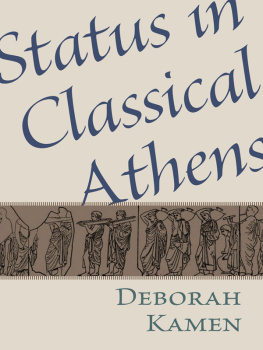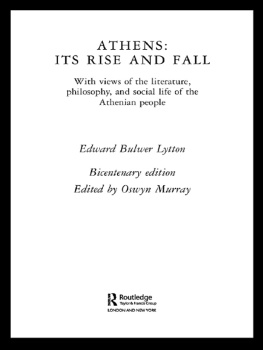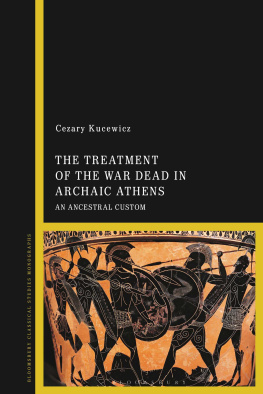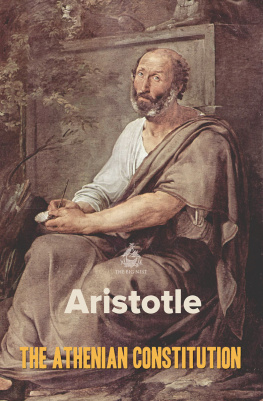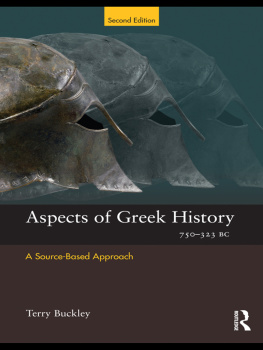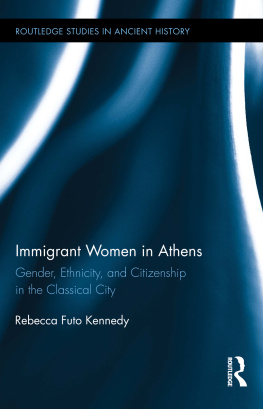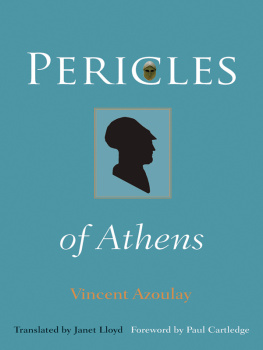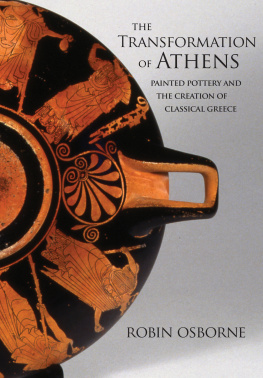
STATUS IN CLASSICAL ATHENS
STATUS IN CLASSICAL ATHENS
DEBORAH KAMEN
PRINCETON UNIVERSITY PRESS
Princeton and Oxford
Copyright 2013 by Princeton University Press
Published by Princeton University Press, 41 William Street, Princeton, New Jersey 08540
In the United Kingdom: Princeton University Press, 6 Oxford Street,
Woodstock, Oxfordshire OX20 1TW
press.princeton.edu
All Rights Reserved
Library of Congress Cataloging-in-Publication Data
Kamen, Deborah.
Status in classical Athens / Deborah Kamen.
pages cm
Includes bibliographical references and index.
ISBN 978-0-691-13813-8 (hardcover : alk. paper) 1. Athens (Greece)Social conditions. 2. GreeceSocial conditionsTo 146 B.C. 3. Social statusGreeceAthensHistory. I. Title.
DF275.K28 2013
305.0938'5dc23 2012040983
British Library Cataloging-in-Publication Data is available
This book has been composed in Baskerville and John Sans
Printed on acid-free paper.
Printed in the United States of America
10 9 8 7 6 5 4 3 2 1
For HBK
PREFACE
THE IMPETUS FOR THIS BOOK COMES FROM TWO SOURCES. THE FIRST IS MY Ph.D. dissertation on manumission in ancient Greece (Berkeley 2005). One relatively small part of this project involved assessing the legal and social status of freed slaves in classical Athens, which led me to try to map out the full range of Athenian status groups. That map, in all of its complexity, proved so compelling to me that it took on a life of its own, eventually expanding and developing into this book. The second is my interest in contemporary issues of status. As is well known, some residents of the United States, despite their participation in the countrys social and economic spheres, are not granted access to full citizen rights (e.g., green cardholders, people on student and work visas, undocumented immigrants), nor are all U.S. citizens able to exercise the totality of their civic rights: prisoners, ex-cons, gay people, homeless people, people with disabilities, and racial minorities (to name just a few groups) face both legal restrictions and social stigmatization. The gap between the ideology of equality (inscribed, for example, in the Constitution) and the reality of inequality (dramatically voiced, while I was writing this book, by the Occupy Wall Street movement) is of course not directly parallel to what we find in classical Athens, but I hope that by critically reflecting upon similar tensions in the ancient world we might view with new eyes the range of statusesand status inequalitiesin our own societies.
I have many people and institutions to thank for their assistance in writing this book. First, my teachers. My interest in the ancient world was kindled in high school, thanks in no small part to my Latin teacher Michael Fiveash. For continuing to shape my intellectual interests, I will always be grateful to the terrific professors I had at Bryn Mawr (especially Richard Hamilton and Corey Brennan), Oxford (in particular Robert Parker), and Berkeley (especially the members of my dissertation reading committee: Ron Stroud, David Cohen, and Marianne Constable). Greatest thanks are owed to my dissertation advisor, Leslie Kurke, whose encouragement and mentorship over the years have been invaluable.
Writing this book would have been impossible without the support of my fabulous colleagues at the University of Washington, especially Ruby Blondell, Alain Gowing, Sandra Joshel, and Kate Topper. The impressive Classics graduate students in my Athenian citizenship seminar at the University of Washington (fall 2009) helped me think through the ideas of this book while they were still in the development stage. The Mellon Fellowship I held at Stanford facilitated the beginning of this project, and the Royalty Research Fund Grant I received from UW was key to its timely completion.
For offering very useful comments and/or bibliographic suggestions while this book was in manuscript form, I am grateful to Ruby Blondell, Sarah Levin-Richardson, Peter Liddel, David Mirhady, Lauri Reitzammer, Daniel Tompkins, and Princetons two anonymous reviewers. Radika Bhaskar and the members of Lunch Circle provided tremendous support throughout the book-writing process. I also thank Rob Tempio for his generosity and skill in guiding me through the process of publishing my first book; Natalie Baan for shepherding the book through production; and Emma Young for her careful copyediting.
Finally, I am thankful for the love and encouragement I receive from my family and friends. Most of all, I am indebted to my partner Sarah Levin-Richardson, who makes my work better and my life much more enjoyable.
CONVENTIONS AND ABBREVIATIONS
IN THIS BOOK, I TRANSLITERATE GREEK WORDS FOLLOWING THE CONVENTIONS of the Chicago Manual of Style, 16th edition, Table 11.4. For Greek proper names and place names, I use the same system of transliteration, except when Latinized versions of these names are more familiar. Inevitably, this leads to some inconsistency: for instance, I use the spellings Aeschines, Chaeronea, and Pericles, but also Apollodoros, Aigospotamoi, and Thrasyboulos. All translations of Greek texts are my own unless I specify otherwise.
Throughout this book I refer to prices and wages using units of Greek currency: six obols = one drachma; one hundred drachmas = one mna; and sixty mnas = one talent. For reference, a loaf of bread in classical Athens cost about one obol, and a days pay for a skilled workman ranged from one to two drachmas.
With some exceptions, the abbreviations of ancient works are used in accordance with Simon Hornblower and Anthony Spawforth, eds., The Oxford Classical Dictionary, 3rd edition (1996); those of modern works for the most part follow the American Journal of Archaeology 95 (1991): 116.
ANCIENT WORKS
Ael. | Aelian |
VH | Varia Historia |
Aesch. | Aeschines |
Ammon. | Ammonius grammaticus |
Andoc. | Andocides |
Ant. | Antiphon |
Aristoph. | Aristophanes |
Ach. | Acharnians |
Lys. | Lysistrata |
Thesm. | Thesmophoriazousai |
Arist. | Aristotle |
Pol. | Politics |
Prob. | Problems |
Rhet. | Rhetoric |
[Arist.] | ps.-Aristotle |
Ath. Pol. | Athnain Politeia |
Oik. | Oikonomika |
Athen. | Athenaeus |
Dem. | Demosthenes |
Ep. | Epistles |
[Dem.] | ps.-Demosthenes |
Din. | Dinarchus |
Dio Chrys. | Dio Chrysostomus |
Diogenian. | Diogenianus Paroemiographus |
D. L. | Diogenes Laertius |
Harp. | Harpocration |
Herod. | Herodas |
Hesych. | Hesychius |
Hyp. | |
Next page
